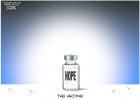Placebo-Controlled Trials of Covid-19 Vaccines — Why We Still Need Them. New England Journal of Medicine 2020. https://doi.org/10.1056/NEJMp2033538
Recent announcements that some Covid-19 vaccines are estimated to have high short-term efficacy provide new hope that vaccination will soon contribute to controlling the pandemic. The initial roll-out of limited quantities of vaccines that are still investigational will provide the opportunity to ethically obtain pivotal data to improve regulatory and public health decision making, thereby increasing public and professional confidence in these and other vaccines.
After relatively short follow-up in phase 3 trials, even when vaccine efficacy appears to be high, reliable information will still be needed on longer-term safety and duration of protection. Other information gaps will include more comprehensive assessments of short-term safety, knowledge of whether waning of vaccine-induced protection may lead to vaccine-enhanced disease if a vaccinee becomes infected on exposure to SARS-CoV-2, information on protection against clinically severe forms of Covid-19, and knowledge of any associations between the degree of protection and the recipient’s age or coexisting conditions. Even after the first vaccines become available, it will still be important to evaluate additional vaccines to meet worldwide needs.1
Recent announcements that some Covid-19 vaccines are estimated to have high short-term efficacy provide new hope that vaccination will soon contribute to controlling the pandemic. The initial roll-out of limited quantities of vaccines that are still investigational will provide the opportunity to ethically obtain pivotal data to improve regulatory and public health decision making, thereby increasing public and professional confidence in these and other vaccines.
After relatively short follow-up in phase 3 trials, even when vaccine efficacy appears to be high, reliable information will still be needed on longer-term safety and duration of protection. Other information gaps will include more comprehensive assessments of short-term safety, knowledge of whether waning of vaccine-induced protection may lead to vaccine-enhanced disease if a vaccinee becomes infected on exposure to SARS-CoV-2, information on protection against clinically severe forms of Covid-19, and knowledge of any associations between the degree of protection and the recipient’s age or coexisting conditions. Even after the first vaccines become available, it will still be important to evaluate additional vaccines to meet worldwide needs.1







